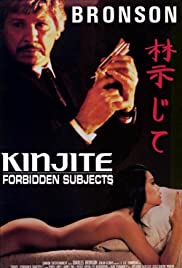
KINJITE: FORBIDDEN SUBJECTS
US, 1989, 97 minutes, Colour.
Charles Bronson, Perry Lopez, Juan Fernandez, Bill Mc Kinny.
Directed by J.Lee Thompson.
Kinjite: Forbidden Subjects is yet another Charles Bronson vengeance thriller, directed by J. Lee Thompson (St. Ives, White Buffalo, Evil That Men Do, Ten to Midnight). J. Lee Thompson's career in England focused on domestic dramas and thrillers. He also directed such spectacles as The Guns of Navarone. However, his career in Hollywood offered routine comedies and thrillers - especially with an ageing Charles Bronson.
The film focuses on the Los Angeles Police Department, gangs involved in the kidnapping of children for sexual purposes. Clearly audience sympathy is for the victims and against the dealers. Whether audiences can share the ultimate violent approach of Bronson is another thing - however, there is an appeal to the outrage of ordinary citizens. The film has been accused of slightly exploiting what it set out to condemn. But, it is another in the Death Wish mode of Charles Bronson thrillers.
1. The title, its explanation, Japanese word - and the focus on the Japanese and their relationship with Americans? Forbidden subjects?
2. Charles Bronson, his screen personage? The work of J. Lee Thompson and their collaboration? Police thriller, vice squad, vengeance and justice?
3. The slick style: Los Angeles, vice, wealth, domestic sequences? Japanese sequences, businessmen, the homes? Customs? the contrast between the U.S. and Japan? Musical score?
4. Crowe and the Charles Bronson type: upholding the law, relying on norms, his own puritanical attitudes towards sexuality? His relationship with his wife? her easier manner? His love for his daughter, over-concern for her, comparisons with the Japanese daughters? His dislike of Duke, the challenge? Duke insulting him and his daughter at the ball game? Trashing his car? His raid to rescue the girl, his attack on the client? His partner? The bond between the two? The commanding officer? His being in a rage, discussions with the priest, his confession? His racist attitudes and his comments on the Japanese owning Los Angeles, his confrontation at the social? His daughter and the assault and his over-reaction? The comment of the commander? Worried about his daughter, her swimming and posing for photos, with the boyfriend? His being given the case of the disappearing Japanese girl, following the leads? Going to the priest and getting information about Duke, going to the tailor? Going to the hotel, dropping the black man into the swimming pool? Finding the girl and restoring her to her parents? Her parents and their gift, the message? Duke and the boat? The final chase, the car cruncher? Duke unable to swim - and Crowe sending him to prison for sexual abuse and poetic justice?
5. Crowe's wife and her ordinariness, balance? The daughter and her love for her father, the ball game, the date, the swimming and the photos, the insult by Duke? Her friend, the assault in the bus, the interrogation, her own prejudices? Recognising the Japanese but not saying anything?
6. Crowe's partner, sharing in the work, his greater caution, his death?
7. Duke and his henchmen, his women and the girls, the drugs, at the ball game and scouting out victims, his taunting of Crowe and his daughter, the trashing of the car? Stalking the children and the young arrivals in Los Angeles, boys and girls, the story of hustling? Stalking the Japanese girl, luring her? The brutal sexual initiation? Sending her to clients: the man who spanked her, the older lesbian? The raid? His disappearance, going to his boat, his vengeance against Crowe and the chase, crushing the car? His crash and being unable to swim? His becoming the sexual victim in prison?
8. The Japanese and their learning English, American business manners? Sexuality, drink? The family, the children? The wife and her distance? Going to the U.S., the apartment, school? The children and learning the brush strokes? The little girl lured, the flower? Wanting to go home, the sexual initiation and brutality, her reaction to the clients? Her being rescued and apologising? Losing face, ashamed? Her final message, her ritual killing of herself? The parents and their grief? The father and his watching the woman being felt on the train, the attack on Crowe's daughter? The reconciliation with his wife?
9. The sketch of the clients and children used. for sexual purposes?
10. The realism of the plot, the melodramatic way in which it was presented (exploitive or not?), rage, violence? Audiences sharing Crowe's solutions or not?